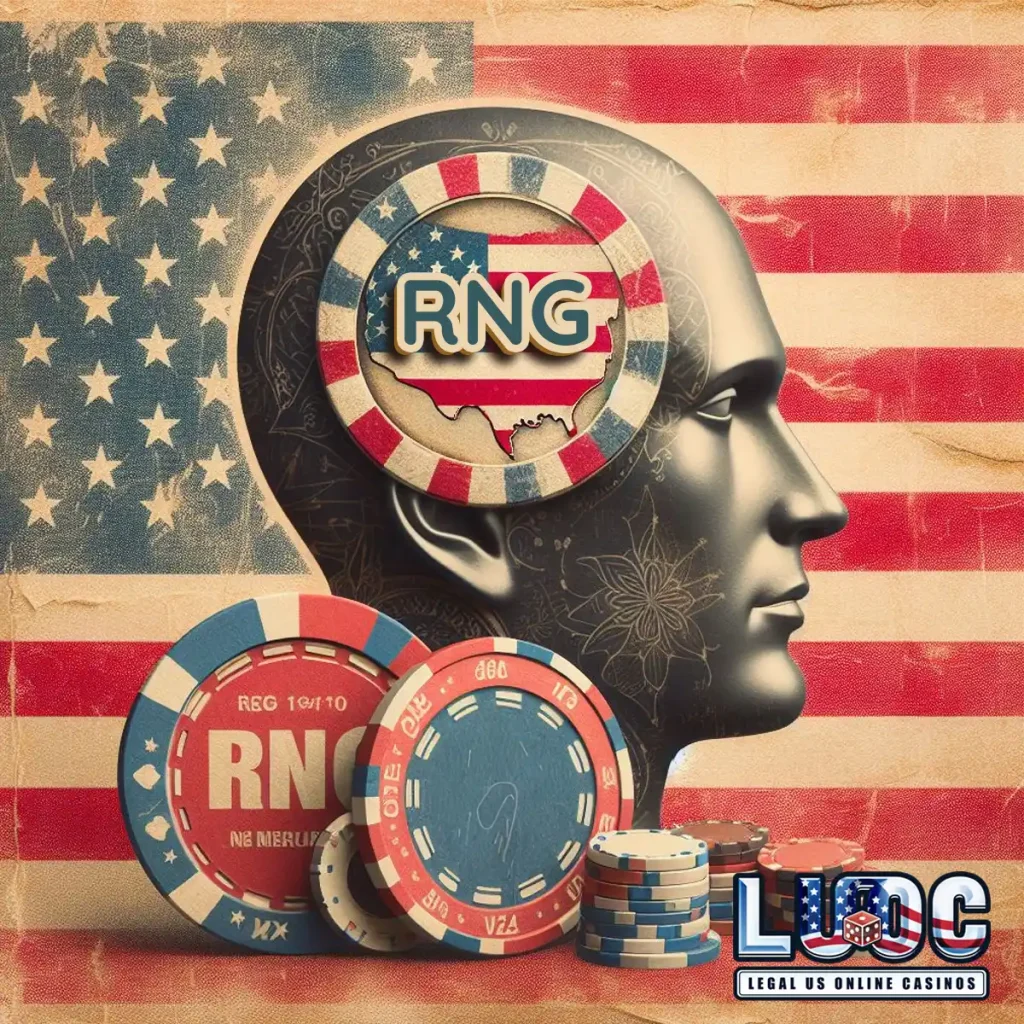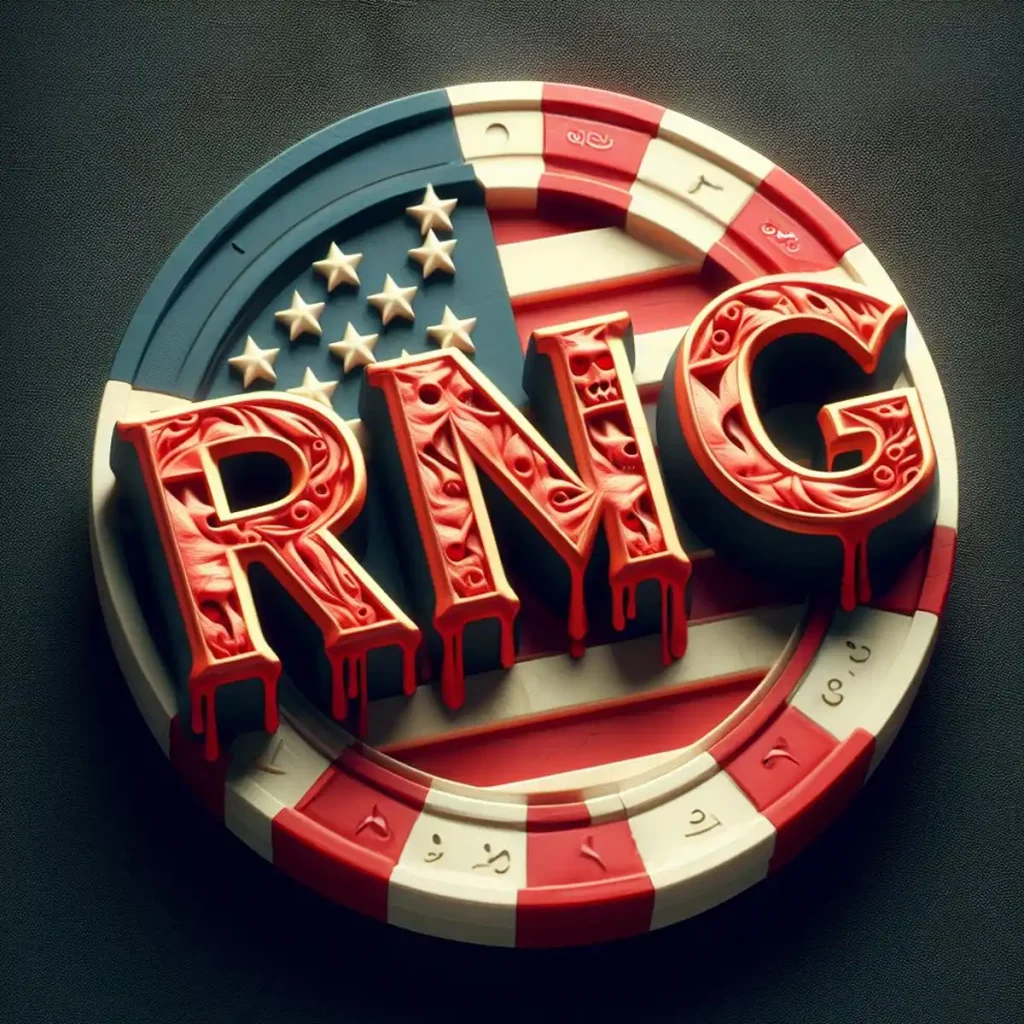Casino RNG, or Random Number Generator, is a cornerstone in ensuring fairness and integrity in online casinos. It is a crucial technology that guarantees an unpredictable and unbiased outcome in every game, hence safeguarding the principle of fair play.

Table of Contents
What is Casino RNG?
Casino RNG is a computational or physical device designed to generate a sequence of numbers or symbols that lacks any discernible pattern, making the results of online casino games unpredictable. This technology is an integral part of slot machines, table games, and other casino offerings.
Mechanism of RNG
Casino RNG operates using complex algorithms and seed numbers. The algorithm is a set of mathematical equations that calculate a random number, while the seed number is the initial value where the algorithm starts its calculations. Together, they create an outcome that cannot be manipulated or predicted.
Types of RNG
There are two types of RNG used in online casinos:
- Pseudorandom Number Generator (PRNG): This type generates a sequence of numbers that appear random, but being algorithm-based, if the initial seed number is known, the sequence can be replicated.
- True Random Number Generator (TRNG): Unlike PRNG, TRNG generates numbers without any deterministic computation. They are derived from an unpredictable physical process, such as atmospheric noise, making them impossible to replicate.
Ensuring Fair Play
RNG’s role in ensuring fair play in online casinos is crucial. It guarantees that game outcomes are entirely random and not influenced by the casino or the player. For instance, in a slot game, RNG ensures that each spin’s result is independent of the previous or next spin.
Verification and Certification
To ensure the integrity of RNG, third-party agencies conduct rigorous testing. These agencies evaluate the RNG algorithm, inspect the source code, and perform a variety of statistical tests to ensure the randomness of results. Reputable online casinos often display their RNG certification as a testament to their fairness.
In conclusion, Casino RNG is the unsung hero behind the scenes, ensuring every player gets a fair shot in online casinos. Its importance cannot be overstated, as it maintains trust, transparency, and fairness in the online gambling industry.

Origins of Random Number Generation in Casinos
Random Number Generation (RNG) in casinos traces its roots back to the mid-20th century. Traditional casino games, such as roulette and craps, inherently relied on randomness. In these games, randomness was achieved through physical means, such as the spin of a roulette wheel or the roll of dice.
With the advent of electronic gaming machines (EGMs) in the 1960s, the need for a digital equivalent to these physical random processes became apparent. Consequently, the first applications of RNG in casinos emerged. The earliest RNGs were hardware-based and used noise sources, like radioactive decay or atmospheric noise, to generate random numbers.
In the 1970s, with the rise of personal computers, software RNG became feasible. These RNGs used mathematical formulas, or algorithms, to generate pseudo-random numbers. These algorithms were designed to produce number sequences that appeared random and were statistically unbiased.
Over the ensuing decades, RNG technology has continued to evolve, driven by advancements in computer science and mathematics. Today, RNG is a crucial component of all digital casino games, ensuring fairness and unpredictability in game outcomes.
The Role of Algorithms in RNG
In the context of casino RNG, algorithms play a pivotal role. They are the mathematical formulas that generate the sequences of numbers which mimic randomness. A common type of algorithm used in RNG is the Linear Congruential Generator (LCG).
An LCG is defined by the recurrence relation:
X_{n+1} = (a*X_n + c) mod mWhere:
X_nis the nth number in the sequence,a,c, andmare constants,moddenotes the modulus operation.
The LCG generates a sequence of pseudo-random numbers, each of which is dependent on the previous number in the sequence. This sequence appears random and is statistically unbiased, provided the constants a, c, and m are chosen correctly.
While LCGs are computationally efficient and have good statistical properties, they do suffer from some limitations. For example, their output can exhibit periodicity if not configured correctly. To mitigate this, modern casino RNGs often use more complex algorithms, such as the Mersenne Twister or Well Equidistributed Long-period Linear (WELL).
These advanced algorithms provide better randomness and unpredictability, ensuring the fairness and integrity of digital casino games. They are also subject to rigorous testing and certification by independent bodies to ensure their compliance with industry standards.
Mathematical Formula for RNG in Casino Fairness Regulation
Random Number Generators (RNGs) are critical components of online casino games, ensuring unpredictability, fairness, and integrity. The mathematical formulas used by RNGs are complex algorithms, typically involving modulus operations, linear congruential generators, or Mersenne Twister algorithms.
The Linear Congruential Generator (LCG) is one of the oldest and most widely used RNGs in computer systems. Its formula is:
Xn+1 = (aXn + c) mod mWhere:
Xnis the current numbera,c,mare constantsmodis the modulus operator
The Mersenne Twister algorithm is a more complex RNG algorithm with a period of 2^19937-1, making it suitable for generating numbers for casino games. The formula is too complex to write out in a single line but involves several bitwise and matrix operations.
Casino regulators mandate the use of RNGs to ensure games are fair and unpredictable. They often require independent testing and certification of RNG algorithms to validate their effectiveness and fairness.
The Importance of RNG in Casino Games
RNGs are the heart of casino games, driving every game outcome. The unpredictability of RNGs ensures that each game round is independent, meaning that past results have no influence over future outcomes. This is crucial for games like roulette, slots, or card games where randomness is essential.
RNGs also ensure fairness in casino games. Fair games are those where players have a statistically predictable return, usually expressed as Return to Player (RTP). RNGs ensure that the actual RTP closely matches the theoretical RTP over a large number of game rounds.
Here are a few core reasons why RNGs are vital in casino games:
- Unpredictability: RNGs ensure that each game outcome is entirely independent and unpredictable.
- Fairness: RNGs ensure that game results are statistically fair, and no player or casino can predict or manipulate the outcome.
- Regulation Compliance: Regulated casinos are required to use RNGs for their games to ensure fairness and integrity.
In conclusion, RNGs are vital for the functioning of casino games, providing an environment of fairness, unpredictability, and regulatory compliance. Without RNGs, the trust in and integrity of online casino games would be compromised.
How RNG Affects Online Casino Games
The Random Number Generator (RNG) is a fundamental component that significantly impacts online casino games. Essentially, it is a computational or physical device designed to generate a sequence of numbers or symbols that lack any discernible pattern, thus rendering them truly random. This randomness is crucial for the integrity and fairness of online casino games.
- Game Fairness: The RNG ensures game fairness by generating random outcomes. This unpredictability prevents both the players and the casino from manipulating results, thereby providing a level playing field for all participants.
- Gameplay Dynamics: RNG determines various gameplay dynamics, such as the shuffling of virtual cards in online poker or blackjack, the spinning of the roulette wheel, or the appearance of symbols in online slots.
- Impacts Winning Probability: RNG directly influences the probability of winning. Each spin or draw is independent and has an equal chance of resulting in a win or loss.
- Trust and Credibility: Online casinos use RNGs certified by independent third parties to build trust and credibility with their players. Players are more likely to engage with a casino knowing that the outcomes are genuinely random and not rigged.
- Regulation Compliance: Online casinos are required by gaming regulators to use RNGs to ensure fair play. Non-compliance can lead to penalties and loss of licenses.
Role of RNG in Online Slots
In online slots, the RNG plays a central role in determining the outcome of every spin. Here’s how it works:
- Random Outcome Generation: Every time a player clicks the ‘spin’ button, the RNG generates a random number. Each number is associated with a different combination of symbols, which is then displayed on the reel.
- Independence of Spins: Each spin is independent of the previous or subsequent spins. This means that the outcome of a spin does not influence future spins. Even if a jackpot was hit on the previous spin, the odds of hitting it on the next spin remain the same.
- No Predictability: The RNG operates in a way that makes it impossible to predict the next sequence of symbols. No betting system, strategy, or timing technique can influence or forecast the next outcome.
- Hit Frequency and RTP: RNG also determines the hit frequency (how often a winning combination appears) and the Return to Player (RTP) percentage. However, these are calculated over a long period, and short-term outcomes remain random.
In conclusion, the RNG is the backbone of online casino games, ensuring their unpredictability, fairness, and excitement. Whether it’s poker, roulette, blackjack, or slots, the RNG guarantees that every game round is independent and equally likely to result in a win or loss.
Role of RNG in Online Roulette
In online roulette, the Random Number Generator (RNG) plays an indispensable role. It is responsible for the random outcome of each spin, ensuring the game’s fairness and unpredictability. The RNG generates a series of random numbers, each corresponding to a specific outcome on the roulette wheel.
Generation of Random Outcomes: The RNG continually generates random numbers, even when the game is not in play. Each number corresponds to a particular slot on the roulette wheel. When the player initiates a spin, the most recent number generated by the RNG determines the outcome.
Fairness and Unpredictability: The RNG ensures that each spin’s result is independent of the previous one, maintaining the game’s unpredictability. This feature reinforces the game’s fairness, as each player has the same probability of winning or losing.
Testing and Certification: To guarantee the integrity of the game, independent testing agencies regularly audit the RNG used in online roulette. These agencies verify that the RNG produces truly random outcomes and certify its reliability for public use.
Role of RNG in Online Craps
The RNG also plays an equally crucial role in online craps. It is responsible for generating the outcome of the dice roll, maintaining the game’s unpredictability and fairness.
Generation of Random Outcomes: In online craps, the RNG generates two random numbers for each roll, each number representing the outcome of a die. The combined result of these two numbers determines the outcome of the roll.
Fairness and Unpredictability: Just like in online roulette, the RNG in online craps ensures that each roll is independent of the previous one. This feature maintains the game’s unpredictability and reinforces its fairness, as each player has an equal chance of winning or losing.
Testing and Certification: Independent testing agencies also regularly audit the RNG used in online craps. These agencies verify the RNG’s randomness and certify its reliability for public use. The regular auditing and certification process ensures that the RNG works as intended, providing a fair and transparent gaming experience for all players.
Role of RNG in Online Baccarat
Random Number Generators (RNG) are integral to the functioning of online Baccarat games. They are computer programs that generate random sequences of numbers without any discernible pattern.
- Card Drawing: In online Baccarat, RNG ensures the randomness of card drawing. The generated sequence determines which card is drawn next, making it impossible to predict or manipulate the outcome.
- Game Fairness: RNG’s role extends to ensuring fairness in online Baccarat. By generating unpredictable number sequences, it maintains an unbiased gaming environment where every player has an equal chance of winning.
- Game Integrity: RNG is responsible for preserving the integrity of online Baccarat games. It prevents fraud and cheating by making the game outcomes purely random and independent of previous game results.
How RNG Impacts Fairness in Legal Casinos
RNG plays a critical role in sustaining fairness in legal casinos, specifically in online gaming platforms.
- Fair Game Outcomes: RNG technology ensures that every game outcome is entirely random. This randomness ensures that each player has an equal chance of winning or losing, thereby promoting fairness.
- Independent Results: Because RNG produces a new number sequence for every game or round, the results of each game are independent of each other. This independence prevents any possibility of predicting future game outcomes based on past results.
- Audit and Verification: Legal casinos employ third-party auditing firms to verify the functionality and fairness of their RNGs. These audits confirm that the RNGs are working as expected and are not manipulated, further promoting fairness in the casino.
- Player Trust: The use of RNG in legal casinos helps to build trust among players. When players know that the game outcomes are random and the casino cannot influence them, they are more likely to trust the casino and continue playing.
In summary, RNG is vital for maintaining fairness and integrity in both online Baccarat and legal casinos. Its role is to provide random, unpredictable game outcomes, making games fairer and more enjoyable for all players.
Understanding Casino RNG in the US
Casino Random Number Generator (RNG) is a crucial technology used in the US gambling industry. It ensures the fairness and transparency of casino games by generating unpredictable numerical sequences, eliminating the possibility of pattern prediction.
RNGs are used in various casino games, including slot machines, roulette, and card games, to determine the outcome. For example, in slot machines, RNGs are used to randomly select the symbols for each reel. Each number corresponds to a symbol, and the generated number sequence determines the symbols displayed on the payout line.
The operational integrity of RNGs in US casinos is overseen by regulatory bodies such as the Nevada Gaming Control Board and the New Jersey Division of Gaming Enforcement. These organizations perform regular audits to ensure RNGs are functioning correctly and the games are fair.
To further understand the importance of RNGs, let’s dissect their integral components:
- Algorithm: This is the mathematical formula used by the RNG to generate number sequences. It’s designed to be unpredictable and resistant to pattern prediction.
- Seed Number: This is the starting point of the algorithm. It could be any number, but it’s typically derived from the computer’s clock.
- Periodicity: This refers to the length of the number sequence before it starts repeating. Ideally, the periodicity of a good RNG should be longer than the expected life of the universe.
The History and Evolution of RNG in US Casinos
The use of RNGs in US casinos has evolved significantly since their inception. The history of these systems can be traced back to the 1970s when the first electronic slot machines were introduced.
In the early days, RNGs were simple mechanical devices. However, the advent of microprocessor technology in the 1980s revolutionized the field, enabling the creation of more complex and unpredictable RNGs.
By the 1990s, RNGs had become standard in the industry, bringing a new level of fairness and transparency to casino games. They were used in a wide range of games, from slot machines to card games, ensuring that each game outcome was genuinely random and could not be predicted.
Over time, the technology has continued to advance. Modern RNGs, for example, now use highly sophisticated algorithms to generate number sequences, making them more unpredictable and secure than ever before.
Here’s a brief timeline of RNG evolution in US casinos:
- 1970s: Introduction of electronic slot machines and the first mechanical RNGs.
- 1980s: Microprocessor technology revolutionizes RNGs, enabling more complex number sequences.
- 1990s: RNGs become industry standard, ensuring fairness and transparency in a wide range of casino games.
- 2000s-Present: Continued technological advancements lead to the development of highly sophisticated RNG algorithms.
The future of RNGs in US casinos will likely involve further advancements in technology, potentially incorporating quantum computing, which could generate number sequences with even greater unpredictability and security.
Who Regulates RNG in US Casinos?
In the United States, the regulation of Random Number Generators (RNG) in casinos is under the jurisdiction of multiple entities, varying by state. At the federal level, the National Indian Gaming Commission (NIGC) oversees RNG in casinos located on Native American reservations.
For commercial casinos, the regulatory body depends on the specific state in which the casino operates. For example, in Nevada the Nevada Gaming Control Board is responsible, whereas in New Jersey, it’s the New Jersey Division of Gaming Enforcement that takes charge.
A comprehensive list of key regulators includes:
- National Indian Gaming Commission (NIGC)
- Nevada Gaming Control Board
- New Jersey Division of Gaming Enforcement
- Pennsylvania Gaming Control Board
- Illinois Gaming Board
- California Gambling Control Commission
The Role of Regulators in Casino RNG
Regulators of casino RNGs in the United States have a significant role in ensuring the fairness, integrity, and security of casino games. Their main responsibilities include:
- Testing: Regulators are responsible for testing RNG software to ensure its randomness and unpredictability. This is done both before the software is approved for use in casinos and regularly afterwards to maintain compliance.
- Approval: Before a casino can use a specific RNG software, it must first be approved by the regulatory body. Approval is granted only after a rigorous testing process to ensure the RNG’s operation aligns with established standards.
- Monitoring: Regulators continually monitor the use of RNGs in casinos. This includes on-going testing and analysis of game outcomes to ensure ongoing fairness and integrity.
- Enforcement: If a casino’s RNG is found to be non-compliant with regulations, the regulatory body has the authority to enforce penalties, which can range from fines to license revocation.
By performing these roles, regulators ensure that the RNGs used in casinos are fair, random, and secure, thereby maintaining the integrity of the gaming industry and protecting the interests of players.
How Regulators Ensure RNG Fairness in US Online Casinos
In the United States, regulators employ various methods to ensure Random Number Generator (RNG) fairness in online casinos.
- Regulatory Bodies: Regulatory bodies like the Nevada Gaming Control Board, New Jersey Division of Gaming Enforcement and Pennsylvania Gaming Control Board oversee the operations of online casinos. They enforce strict guidelines regarding RNG usage.
- RNG Certification: Online casinos are required to have their RNG algorithms certified by independent testing agencies, such as eCOGRA, iTech Labs, and GLI. These agencies test the RNG algorithms against mathematical tests of randomness and statistical analyses.
- RNG Auditing: Regular audits are conducted to ensure RNG systems continue to operate fairly. These audits scrutinize the game outcomes and RNG algorithms, checking for any patterns or biases.
- Transparency: Regulators require online casinos to be transparent about their RNG systems. Casinos must publish information about their RNG certification and audit results for players to view.
- Legal Enforcement: In case of RNG manipulation or any unfair practices, regulators can impose hefty fines, revoke licenses, and even initiate legal proceedings against the offending casino.
Debunking Myths and Misconceptions about Casino RNG
Many myths and misconceptions surround the operation of RNGs in casinos. Here are some debunked:
- Myth: RNGs are rigged: This is false. Reputable online casinos use RNGs certified by independent testing agencies. Rigging RNGs could result in severe legal penalties.
- Myth: RNGs can be predicted: RNG algorithms are designed to be unpredictable, with virtually infinite possible outcomes. While RNGs do follow a mathematical algorithm, the sequence and timing of numbers generated are effectively random.
- Myth: The casino can change the RNG outcome: False. RNGs operate independently of the casino. Any interference with the RNG system would require recertification and is highly illegal.
- Myth: Previous outcomes influence future RNG results: This is known as the gambler’s fallacy. In reality, RNG outcomes are independent events, and previous results have no bearing on future outcomes.
- Myth: Certain times of day are luckier: RNGs operate continuously, generating random numbers at all times. There is no ‘lucky’ or ‘unlucky’ time of day.
Understanding the regulatory measures in place and debunking the myths can help players trust the fairness of RNG systems in online casinos.

Common Myths about Casino RNGs
Casino Random Number Generators (RNGs) have been subject to various misconceptions, which can often lead to confusion and misinformed decisions. Here are some of the most common myths:
- Myth: RNGs can be manipulated. Some believe that online casinos can manipulate RNGs to benefit the house. However, this is false. Reputable online casinos use RNGs that are audited by independent organizations to ensure fairness.
- Myth: RNGs are predictable. Another prevalent myth is that RNGs follow a pattern that can be predicted. This is incorrect. RNGs generate sequences of numbers that are statistically random and independent from each other.
- Myth: RNGs are less fair than physical games. Many players believe that RNGs are less fair than traditional casino games. This is not true. RNGs are designed to emulate the randomness of physical games, and they are subject to rigorous testing for fairness.
- Myth: RNG outcomes can be influenced by previous outcomes. Some players think that if a particular outcome has not occurred for a long time, it is due to happen soon. This is known as the gambler’s fallacy and is not true. Each RNG outcome is independent and unaffected by previous results.
Fact vs Myth: The Truth about RNG Fairness and Reliability
To dispel the prevailing myths, it’s important to understand the facts about RNGs. Here are the truths regarding RNG fairness and reliability:
- Fact: RNGs are rigorously tested. RNGs used by reputable online casinos are subjected to stringent testing by independent organizations such as eCOGRA or Technical Systems Testing. These organizations audit the RNGs to ensure they produce fair and statistically random results.
- Fact: RNGs are unpredictable. The algorithms used in RNGs are designed to be unpredictable. The sequence of numbers they generate do not follow a predictable pattern.
- Fact: RNGs are reliable. RNGs are reliable tools for ensuring the randomness of outcomes in online casino games. They are designed to mimic the randomness of physical games, ensuring a fair gaming experience.
- Fact: Every RNG outcome is independent. Each number generated by an RNG is independent of the ones before it. This means that previous outcomes have no influence on future results, debunking the gambler’s fallacy.
In conclusion, understanding the facts about RNGs can help dispel common myths and misconceptions. It’s essential to remember that reputable online casinos use RNGs that are audited and certified for fairness and randomness, ensuring a fair and enjoyable gaming experience.
Conclusion
The use of Random Number Generators (RNGs) in the online casino industry is pivotal, ensuring fairness and unpredictability in game outcomes. RNGs are at the core of trust and integrity in online gambling. They guarantee that each game result is entirely random, providing an impartial gaming environment that mirrors the randomness of traditional, physical casinos.
The implementation of RNGs in casino gaming software has revolutionized the industry, allowing for a shift towards online platforms. In terms of security, RNGs are subjected to rigorous testing by independent bodies to certify their functionality and fairness. These audits reinforce the credibility of online casinos and the gaming software they utilize.
RNG algorithms are complex mathematical formulas that generate a sequence of numbers which cannot be reasonably predicted better than by random chance. This complexity serves as a barrier against manipulation and exploits.
The types of RNGs used in online casinos typically include Pseudorandom Number Generators (PRNGs) and True Random Number Generators (TRNGs). PRNGs, powered by initial seed values, are most commonly used due to their efficiency and reliability. TRNGs, which derive randomness from physical processes, are less common but offer absolute unpredictability.
The impact of RNGs on the player experience is significant. They ensure that every game played is fair, with outcomes that are entirely random and independent of previous results. This fosters a fair and enjoyable gaming environment, enhancing user experience and satisfaction.
In conclusion, RNGs are indispensable for the online casino industry. They foster trust and fairness in online gambling, ensuring that all players have an equal chance of winning. To maintain this, regular audits and updates to RNG software are crucial to keep up with technological advancements and potential security threats. This constant vigilance ensures the longevity and credibility of the online casino industry.



